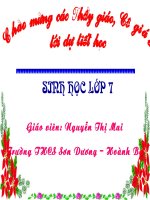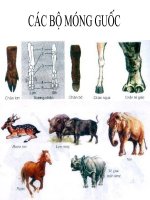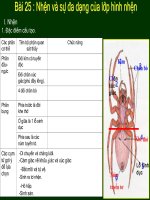Tải Giáo án tiếng Anh lớp 11 Tuần 28 sách mới - Giáo án điện tử môn tiếng Anh 11 theo tuần
Bạn đang xem bản rút gọn của tài liệu. Xem và tải ngay bản đầy đủ của tài liệu tại đây (99.77 KB, 6 trang )
<span class='text_page_counter'>(1)</span><div class='page_container' data-page=1>
<b>GIÁO ÁN TIẾNG ANH LỚP 11 TUẦN 28</b>
<b>NĂM 2019 - 2020</b>
Date of preparation:
<b>Date of signing: </b>
<b>Period 83: </b>
<b>UNIT 9: CITIES OF THE FUTURE</b>
<b>Part 1: Getting started</b>
<b>I. Objectives</b>
By the end of the lesson, students will be able to:
<b>1. Knowledge</b>
- Get to know the topic of unit 9
+ Vocabulary: words and phrases related to cities of the future.
+ Pronunciation: intonation in questions tags
+ Grammar: question tags and the conditional sentence type 0
<b>2. Skills</b>
- develop Listening, speaking, writing, reading skills
<b>3. Attitude</b>
- be responsible for their study to better their future.
<b>II. Teaching method: Integrated, mainly communicative</b>
<b>III. Teaching aids</b>
- CD & CD player, board, chalks, textbook and notebook.
<b>IV. Procedure</b>
<b>1. Class organization: </b>
Date Period Class Attendance Absentees/Notes
….. __ / __ / __ …. / ….
<b>2. Previous lesson check: </b>
<b>- No.</b>
<b>3. New lesson:</b>
T’s and Ss’Activities Knowledge
- Tell Ss that they are going to listen to a
</div>
<span class='text_page_counter'>(2)</span><div class='page_container' data-page=2>
conversation between Phong, Chi and Ha.
- Ask them to read the heading and guess what
the two speakers will be talking about
- Play the recording. Have Ss listen and read
the conversation silently. Then ask Ss if their
predictions were correct. Have Ss summarise
the conversation.
- Ss listen and read the conversation, take notes
new word
- Ask Ss to read the conversation again and
answer the questions.
- Let Ss compare their answers in pairs or
groups.
- Check Ss’ answers as a class.
- Ask Ss to read the conversation again and
find the question tags.
- Let Ss compare answers in pairs or groups.
- Check Ss’ answers as a class.
Activity 2: Answer the questions
1. It’s about life in the city in the year 2050
2. Both think life will be better; Phong
believes modern technology will be the
reason, while Chi thinks there will be no
pollution
3. They choose to talk about the environment
4. Solar energy is mentioned. This energy can
be used for transport, lighting, cooking,
heating water and helping plants grow
5. Yes. Thanks to the development of science
and technology, our life will be better and
more liveable in the year 2050.
Activity 3: Find the question tags in the
conversation
1. It’s a group presentation, isn’t it?
2. You mean it will be environmentally
friendly, won’t it?
</div>
<span class='text_page_counter'>(3)</span><div class='page_container' data-page=3>
- Ask Ss to complete the sentences.
- Have them write the sentences in the space
provided
- Check Ss’ answers. Ask Ss to explain the
differences between the sentence structures.
1. … the air will become cleaner and our
health will be better (1)
2. People can develop health problems and
become ill … (1)
3. … we’ll be able to generate our own
electricity (1)
4. … their impact on the environment is less
(0)
5. Let me know … (0)
<b>4. Consolidation: </b>
- Summarize the main points:
Getting to know the topic
<b>5. Homework: </b>
- practice the tasks.
- prepare for the next lesson
<b></b>
---o0o---Date of preparation:
Date of signing: <b> </b>
<b>Period 84: </b>
<b>UNIT 9: CITIES OF THE FUTURE</b>
<b>Part 2: Language</b>
<b>I. Objectives</b>
By the end of the lesson, students will be able to:
<b>1. Knowledge: know some new language items:</b>
+ Vocabulary: words and phrases related to cities of the future.
+ Pronunciation: intonation in questions tags
+ Grammar: question tags and the conditional sentence type 0
<b>2. Skills</b>
- develop Listening, speaking, writing, reading skills
<b>3. Attitude</b>
- be responsible for their study to better their future.
</div>
<span class='text_page_counter'>(4)</span><div class='page_container' data-page=4>
<b>III. Teaching aids</b>
- CD & CD player, board, chalks, textbook and notebook.
<b>IV. Procedure</b>
<b>1. Class organization: </b>
Date Period Class Attendance Absentees/Notes
….. __ / __ / __ …. / ….
<b>2. Previous lesson check: </b>
- act out the conversation.
<b>3. New lesson:</b>
T’s and Ss’Activities Knowledge
- Have Ss go through the words given in the
box and discuss with a partner their meanings.
- Ss fill the blanks with the right form of the
word from the box. Have Ss complete the
sentences individually, then compare their
answers in pairs or groups.
- Ask Ss to read the uncompleted sentences
and pay attention to the contextual clues such
as words surrounding the gap and the part of
speech needed.
- Have Ss complete the sentences individually,
then compare answers in pairs or groups.
- Check Ss’ answers as a class.
- Have Ss listen and notice the intonation
pattern of the questions
- Have them listen and repeat the exchanges
with appropriate intonation.
A. Vocabulary:
Activity 1: Write the words or phrases given
in the box next to their meaning
1. inhabitants 2. infrastructure
3. renewable 4. urban
5. liveable 6. sustainable
7. overcrowded 8. quality of life
Activity 2: Complete the sentences with the
right forms of the words in the phrases in 1
1. urban 2. liveable
3. infrastructure
4. overcrowded
5. inhabitants
6. renewable
7. quality of life
8. sustainable
B. Pronunciation
Intonation: Question tags
</div>
<span class='text_page_counter'>(5)</span><div class='page_container' data-page=5>
<i>- Ask them to study the Do you know…? box </i>
to learn some general rules of intonation
patterns for question tags.
- Play the recording and ask Ss to read along
with the recording, imitating the intonation
patterns.
- Have them practice the exchanges in pairs,
taking turns to ask and answer the questions.
- Ask some pairs to role-play the exchanges in
front of the class, using appropriate intonation
patterns.
- Praise Ss who can reproduce these exchanges
with good pronunciation and appropriate
intonation.
- Have S work individually first
<i>- Encourage them to refer to the Do you </i>
<i>know..? box to get more information about the </i>
classes. Ask Ss questions to check if they
understand the general rules related to the form
and usage of this grammar point.
- Ask Ss to compare answers in pairs
- Check Ss’ answers as a class.
- Ask Ss to read the statements carefully,
underline the subjects and verbs in these
sentences, and write the correct question tags
in the blanks.
- Have Ss rewrite their sentences on the board.
1. falling
2. rising
3. rising
4. falling
5. rising
Activity 2: Listen and repeat the exchanges in
1
III. Grammar: Question tags
Activity 1: Mach the question tags with the
statements to make complete sentences
1. c 2. h 3. f 4. d
5. g 6. a 7. b 8. e
Activity 2: Complete the sentences with the
correct question tags
</div>
<span class='text_page_counter'>(6)</span><div class='page_container' data-page=6>
- Check Ss’ answers as a class.
- Ask Ss to read through the conditional
sentences used in the conversation again.
- T explains to Ss the basic different between
type 0 and type 1.
- Ask Ss to do the task.
- Ask Ss to combine the sentences to make
conditional sentences.
- Have Ss rewrite their sentences on the board.
- Check Ss’ answers as a class.
6. aren’t they 7. haven’t they
8. has she
Conditional sentences type 0
Activity 3: Match the if clauses with the result
clauses
1. e 2. c 3. f 4. a
5. h 6. b 7. d 8. g
Activity 4: Combine the sentences or rewrite
them to make conditional sentences.
1. If the baby is crying, he may be hungry (1)
2. If you travel on a budget flight, you have to
pay for your drinks and food (0)
3. If the weather is fine, I walk to work
instead of driving (0)
4. If people start using more solar energy,
there will be less pollution (1)
5. If they have no homework, they usually
play soccer (0)
6. If you travel by train, It takes five hours to
get to Nha Trang (0)
7. If the government reduces the use of fossil
fuels, our city will become a more liveable
place (1)
<b>4. Consolidation: </b>
- Summarize the main points: vocabulary, pronunciation & grammar
<b>5. Homework: </b>
- practice the tasks.
- prepare for the next lesson
Mời bạn đọc tham khảo thêm tài liệu Tiếng Anh lớp 11 tại đây:
</div>
<span class='text_page_counter'>(7)</span><div class='page_container' data-page=7>
Bài tập Tiếng Anh lớp 11 nâng cao:
</div>
<!--links-->









